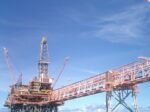Remote detection of oil & gas infrastructure corrosion
Corrosion and it’s degradation of oil and gas infrastructure-pipelines, rigs, towers and refineries-represents an annual cost of many millions of dollars to the industry. There are thousands of kilometres of pipelines operating in more than 50 countries around the world. They form the gathering systems joining wells to process facilities and the distribution system delivering product to refineries and markets. The overwhelming majority of petroleum pipelines are constructed from metal and, whether buried or on the surface, they are all exposed to a range of physical, climatic and chemical environments that can cause corrosion. The corrosion of steel is accelerated in harsh environments, especially coastal, tropical or desert, where high salt levels or extreme temperatures can accelerate the rate of decay. It is important that owners of high-value assets understand the cost implications of ignoring the effects of corrosion. There are many advantages of planning for corrosion control and mitigation, two of which are that the life of an asset can be extended and maintenance time and costs are reduced. As part of the regular technical program, the Australasian Corrosion Association (ACA) is hosting a one-day technical event in Melbourne on 21 May where the latest challenges and developments in the materials engineering and corrosion control for both onshore and offshore environments will be discussed. Sessions will focus on the remote inspection and the identification of hidden corrosion within oil and gas infrastructure. Speakers and participants will have the opportunity to share their work experiences, case studies, best practices, engineering guidelines, and failure analysis in a technical exchange open forum, aiming to look at new technologies and methodologies to fill the gaps in these industries. The events are aimed at oil and gas industry personnel, such as Asset Managers, Structural, Process and Maintenance Engineers, Specialist Contractors and Asset Condition Inspectors, […]






